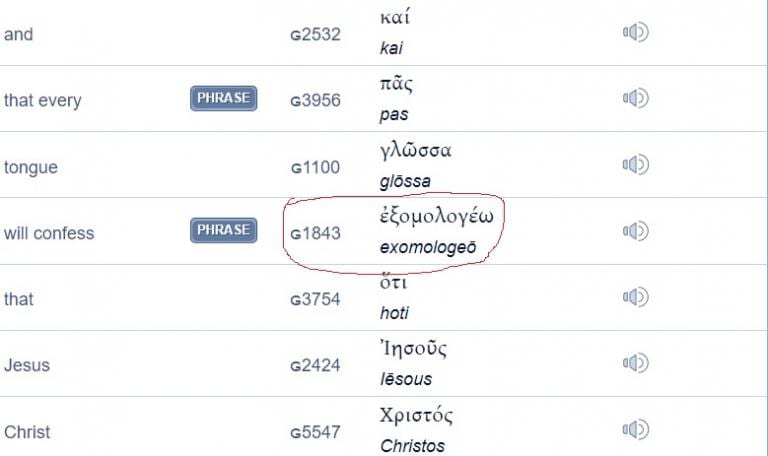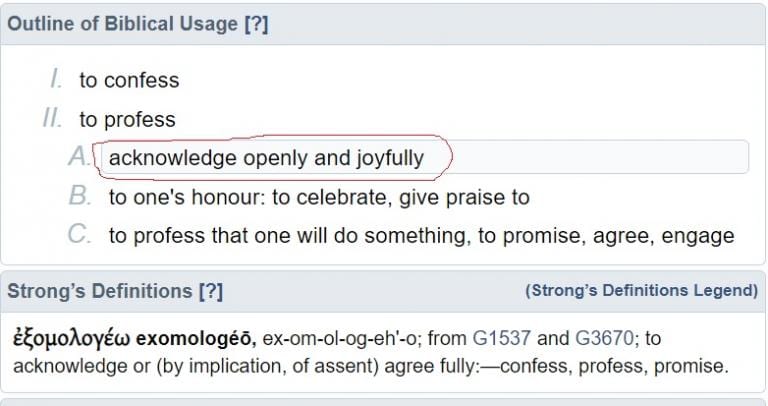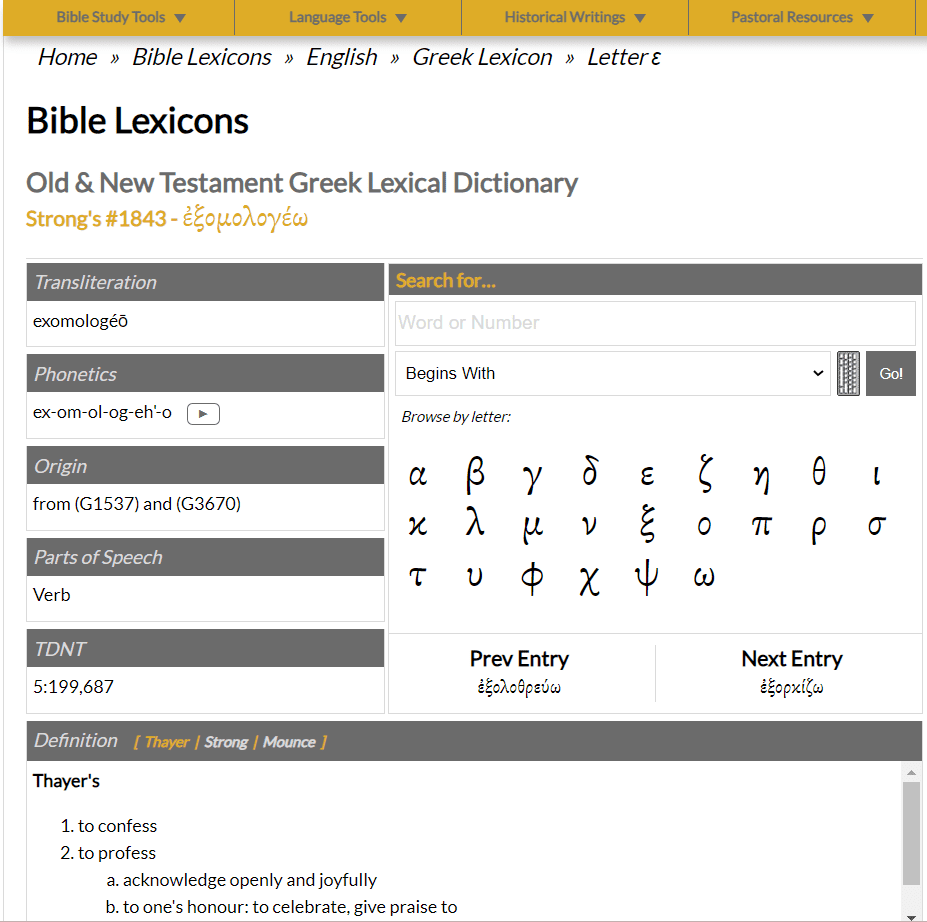
It has come to my attention that several people object to my conclusion that word “exomologeo” in the Greek should be translated as “gladly confess” in Philippians 2:10-11, as I have asserted in my previous article – HOW EVANGELICALS CHANGED THE BIBLE TO SUPPORT THEIR BELIEFS.
In this post, I point out that most translations of this passage render the word as merely “confess,” leaving out the “gladly” part since it conflicts with their assumption that sinners will only confess that Jesus Christ is Lord under compulsion or between clenched teeth.
However, as I said in those posts, the word “exomologeo” literally means “to acknowledge openly and joyfully.”
And I even post screenshots of that definition as proof of my assertion:


However, this isn’t enough to convince the naysayers who contend that my proof isn’t accurate, or that it can’t be true because all those other Biblical translations don’t add the word “gladly,” [which was sort of my original point in the first place, but I digress].
Here are some of the actual arguments made to challenge the “gladly confess” translation of “exomologeo” below.
Darren Clark says:
“Giles treatment of Phil 2:11 is in and of itself an exercise in exegetical fallacy dependent on a so called definition of a word from Strong’s, which is not a proper lexicon at all. The nuance of ‘gladly …’ isn’t inherent in the definition of ἐξομολογέομαι (exomologeomai) in the first place so the fact that ‘nuance’ is not explicit in translations is not evidence of anything remotely akin to the unwarranted removal of a word’s meaning via translation.
“Giles should recent his accusation on the basis that his own exegetical argument is fatally flawed.” –
“Regarding exomologeo and Phil 2:10-11…Specifically, I pulled a few translations from other languages just to see how they translate it, and then Google Translated them.
“Here’s the languages I worked with, covering translations from at least the 1500’s to present.
38 translations in 14 languages: Afrikaans (1), Arabic (2), Bulgarian (1), Catalan (1), Cebuano (2), Czech (2), German (12), Greek (1), Spanish (7), Finnish (1), French (5), Croatian (1), Dutch (1), Albanian (1)Afrikaans (1), Arabic (2), Bulgarian (1), Catalan (1), Cebuano (2), Czech (2), German (11), Greek (1), Spanish (7), Finnish (1), French (5), Croatian (1), Dutch (1), Albanian (1).
“Not one of them says “gladly”. Here are the results in English:
acknowledge (1), admit (2), confess (29), declare (1), proclaim (1), recognize (3), say (1)
Now, I fully understand that this is NOT a formal result, given that Google Translate, while quite reasonable, is not always reliable. But this was also…. well, I don’t know, 20 minutes of work? Seriously, I spent more time on this post than on the actual texts…
So, I’ll be working on confirming these in due time. I have another 2 dozen (?) languages to process, probably another 4 dozen translations, working through the original koine Greek and Hebrew, comparing the word in other passages, etc etc…
“Yeah, do with this information what you will. Seems strange that, so far, only two white men got this right, but not anyone in seemingly all other languages…”
So, to be honest, I am not a Greek scholar. I’m going on the word of other Greek scholars and Greek lexicons to arrive at my conclusions here. But, the Greek scholars I’m listening to are people like David Bentley Hart, a Greek-speaking New Testament Greek and Hebrew scholar who is a fellow at the Notre Dame Institute for Advanced Study and has published a new translation of the New Testament with Yale Press.
Here’s what Dr. Hart had to say when I asked him how he might respond to criticisms of his decision to translate “exomologeo” as “gladly confess” in his new translation of Philippians 2:10-11:
“Again, in koine the typical use was of a willing confession made gladly. Lexica are often uselessly vague; simply consult the general usage in as many texts as you can. You will find no occasion of it that does not involve an acclamation or personal pledge of eager acceptance. It would fit such formulae as “I gladly assume this responsibility” or “I with full will and freedom proclaim my loyalty.”
“And the context from Isaiah is sufficiently clear: שבע always means an act of acclamation, never a forced act of submission. It is an “oath” only in the sense that it is sometimes used as a term for a glad profession of loyalty, like “long live the king!”
“And in fact EVERY credible NT scholar knows thus. Whoever your critics are, they are frauds. This issue is an old chestnut that even Lightfoot addressed.
“By the way, the “ex-“ is specifically meant to indicate an open act of acclamation…so, “exomologeo” is meant to express a “profession of fealty”
“Here’s a link to Thayer’s, the best lexicon for biblical koine. Tell your critics that they are uneducated hacks. ”

NOTE: Thayer’s agrees that the word should be translated as “acknowledge openly and joyfully”
From Thayer’s expanded:
1. to confess: τάς ἁμαρτίας, Matthew 3:6; Mark 1:5; (James 5:16 L T Tr WH) (Josephus, Antiquities 8, 4, 6; (cf. b. j. 5, 10, 5; Clement of Rome, 1 Cor. 51, 3 [ET]; the Epistle of Barnabas 19, 12 [ET])); τάς πράξεις, Acts 19:18; τά παραπτώματα, James 5:16 R G; (ἡτταν, Plutarch, Eum c. 17; τήν ἀλήθειαν ἄνευ βασάνων, id. Anton c. 59).
2. to profess i. e. to acknowledge openly and joyfully: τόὄνομα τίνος, Revelation 3:5 Rec.; followed by ὅτι, Philippians 2:11; with the dative of person (cf. Winers Grammar, § 31, 1 f.; Buttmann, 176 (153)) to one’s honor, i. e. to celebrate, give praise to (so the Sept. for לְהודָה, Psalm 29:5 (); Psalm 105:47 (); Psalm 121:4 (), etc.; (Winer‘s Grammar, 32)): Romans 14:11; Romans 15:9 from Psalm 17:50 () (Clement of Rome, 1 Cor. 61, 3 [ET]); τίνι (the dative of person) followed by ὅτι: Matthew 11:25; Luke 10:21. to profess that one will do something, to promise, agree, engage: Luke 22:6(Lachmann omits); (in this sense the Greeks and Josephus use ὁμολογεῖν).
“I take it your critics are the sort of simpletons who imagine that Paul is describing a forced confession. The verb NEVER EVER had that meaning. But what warped little souls they must have to think Paul’s God such a petty tyrannical little creep.”
“No biblical scholar of the Septuagint—which is the source of Paul’s theological vocabulary—would deny the clear connotation of open acclamation in the term in its biblical usage. Clark and Wolcott obviously are not classicists, much less specialists in late antique koine, so treat them with withering disdain.
“Only someone with no training at all would imagine that a survey of translations has any bearing on the philology of a word or of its usage in a given epoch or context. Most translators aren’t even philological scholars in any meaningful sense; they simply repeat received renderings by other non-philologists. This Wolcott fellow, for instance, is an ignoramus, obviously. That’s why an intelligent student relies on the actual scholarly sources—like Thayer’s. One of the reasons I undertook my translation was my annoyance at the absence of actual classical philologists among translators. One understands why that is so—the best philologists don’t as a rule condescend to popular renderings for broad readerships—but it’s a pity, for reasons you have seen all too clearly.”
So, I’m certain that this response will have little to no effect on those who are determined to hold on to the notion that Philippians 2:10-11 describes the unwilling confession of Jesus as Lord by unrepentant sinners who are begrudgingly compelled to do so moments before Jesus cuts their heads off and tosses them into the lake of fire. But for those who were confused by these claims that “exomologeo” shouldn’t be translated as “gladly confess,” I hope this post sheds enough light for you to see the truth.
**

NEW ONLINE COURSE
Join me for a new 3-week online course based on my best-selling new book, SOLA DEUS.
Class begins Monday, Sept. 11th, 2023.
Keith Giles is the best-selling author of the Jesus Un series. He has appeared on CNN, USA Today, BuzzFeed, and John Fugelsang’s “Tell Me Everything.” He hosts the Second Cup with Keith podcast, and co-hosts the Apostates Anonymous podcast, and the Heretic Happy Hour Podcast.
Find out more about online courses HERE>













